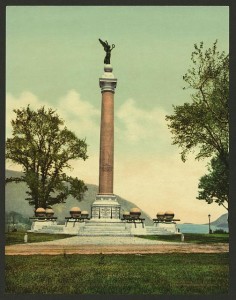A Southern publication succinctly rated the odds of George B. McClellan winning the 1864 presidential election.
From the Richmond Daily Dispatch July 16, 1864:
McClellan on the old flag.
–McClellan, who stands about as much chance for succeeding Lincoln in the Presidential chair as he did of taking Richmond, is playing the “old flag” dodge to further his prospects. In his address at West Point he said:
Rebellion against a Government like ours, which contains the means of self-adjustment, and a pacific remedy for evils, should never be confounded with a revolution against despotic power which refuses redress of wrongs. Such a rebellion cannot be justified upon ethical grounds, and the only alternatives for our choice are its suppression or the destruction of our nationality. At such a time as this, and in such a struggle, political partisanship should be merged into a pure and brave patriotism, which thinks only of the good of the whole country. It was in this cause and with these motives that so many of our comrades have given up their lives and in this we are all personally pledged in all honor and fidelity. Shall such devotion as that of our dead comrades be of no avail. Shall it be said in after ages that we lacked the vigor to complete the work thus begun? That after all these noble lives freely given, we hesitated and failed to keep straight on until our land was saved? Forbid it, Heaven! and give us firmer, truce [truer] hearts than that. Oh, spirits of the valiant dead, souls of our slain heroes, lend us year [your] own indomitable will, and if it be permitted you to commune with those still chained by the trammels of mortality, hover around us in the midst of danger and tribulation — cheer the firm, strengthen the weak, that none may doubt the salvation of the Republic and the triumph of our grand old flag.
This excerpt is from a much longer speech General McClellan delivered at West Point on June 15, 1864 at the dedication of the ground chosen for a Civil War battle monument to commemorate the regular army soldiers who were killed during the war. You can read all about it at The New-York Times. The monument itself was not dedicated until 1897.

![[Civil War envelope showing portrait of Major General George B. McClellan inset in medallion decorated with eagle and American flags] (between 1861 and 1865; LOC: LC-DIG-ppmsca-34635)](https://www.bluegrayreview.com/wp-content/uploads/2014/07/34635r-300x172.jpg)
